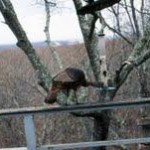A flock of robins flew into the garden yesterday. I’m worried about them. All of the berries have been eaten months ago by resident and migrating birds. And I don’t see any juicy worms or caterpillars afoot. Thanks to my husband, our six birdfeeders are always full, but the robins aren’t interested in seed. And while we, and they, may be lulled (or duped?) by the spring-like temperature, February has always been the most frigid–and to my mind the “cruellest”– month of winter. So who knows what mischief Mother Nature is cookin’ up for us. She now has Europe all-a-snarl in her icy grasp. Are we next?
Canadian geese are also showing up in great numbers, to the consternation of many. A Parks and Recreation Director in Greenwich, Connecticut once called them “flying rats”, and folks there thought about importing Panamanian vultures to kill them. (Hmm, does make you wonder about a town that prefers vultures to geese).
A very different perspective is offered by the Nobel prize winning scientist, Konrad Lorenz, who spent a lifetime studying the Graylag goose. I treasure his book about them, Here Am I – Where Are You; read it and you too will share his love for these smart, endearing, funny birds, who are so much like us: They flirt, fall in and out of love, experience jealousy, and fiercely protect their young. And they are not wanting in tactful diplomacy.
Consider Lorenz’s observations of two sisters, Mitsi and Resi: Among siblings, rank order is established early on and Resi was Numero Uno. One day the sisters emerged victorious from a skirmish with two geese from another flock. Mitzi’s victory was the more spectacular– she grasped the feathers of her opponent in her beak and didn’t let go even as she was towed clear across the pond. So, when she swam back, she sounded a triumphful call in Resi’s ear. Resi, who was taking a bath–her opponent fled without a fight–wanted none of that and snapped at her sister. Poor Mitzi fell silent.
But, Lorenz reports: “An amusing scene followed: as Resi continued her bathing, Mitzi would give vent to triumphful greeting every time her sibling dunked her head into the water, but would become modestly silent when the head reappeared.”
Our world would be sadly diminished if we never heard again the summoning call of wild geese: Here Am I, Where Are You?
And then there are the wild turkeys. They do like birdseed and we like them- a lot. (Did you know they also eat ticks?). Our most interesting encounter came as we were leaving the driveway in our Volvo station wagon and came upon a family of turkeys, a male, a female, and several babies. Of course we stopped the car. As the female scurried after the kids, shooing them from the driveway into the wooded area, the male puffed up his chest, fully displayed his tail feathers and stood his ground in front of the car until the whole family had retreated safely. This fluff of feathers took on a huge, steel monster to protect his family. Amazing courage! (And since it worked, I guess the turkey had quite a story to tell his pals–not to mention bragging rights).
Benjamin Franklin wanted the turkey chosen as our national bird, precisely because of its bravery, but he was outvoted. He didn’t like the ultimate choice, the eagle, because he saw one stealing fish from another bird. “He is a bird of bad moral character,” Franklin said.

